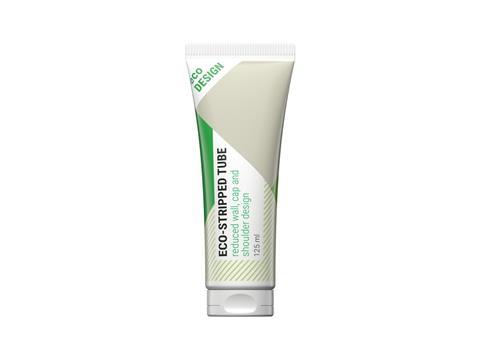
Hoffmann Neopac has introduced Eco-Stripped Tube, which combines a reduced sleeve wall thickness with a comparable materials reduction in the shoulder and cap to offer 30% less virgin plastic content overall.
The latest in Neopac’s EcoDesign series, Eco-Stripped Tube, is an evolution of its LIGHTWEIGHT TUBE, which reduced sleeve wall thickness from 0.5mm to 0.35mm. Neopac says that the next-generation Eco-Stripped Tube builds on this sleeve weight reduction to create a trimmed-down tube construction without compromising on protection, haptics, or aesthetics.
According to Neopac, creating a lower-profile shoulder and cap means that, for size D50 tubes, the Eco-Stripped Tubes sit 9.4 mmm lower with a 3.75kg weight reduction.
Neopac estimates that, in its own packaging manufacturing operations, the new tubes will eliminate the need for as much as 7.7 tonnes of HDPE and PP materials per one million tubes produced. This reportedly translates to an overall carbon footprint reduction of over 29 tonnes of CO2 per million tubes manufactured.
For cosmetics and personal care product customers, Neopac says that the Eco-Stripped Tubes can help to lower both shipping costs and Extended Producer Responsibility (EPR) fees through the 30% overall reduction in virgin materials.
Eco-Stripped Tubes are available in diameters ranging from 30mm to 50mm, for volumes from 40 ml to 300ml. The company adds that, for enhanced product protection and safety, tamper-evident, first-opening options are available.
Cornelia Schmid, head of marketing for Neopac, comments: “The concept behind our new Eco-Stripped Tube is ‘undress to progress’, meaning a key tool in moving toward a circular economy is overall materials reduction – and virgin plastics reduction specifically.
“As a company, we’re continuing to push our sustainability efforts further without sacrificing product protection, haptics, esthetics or other qualities brand owners hold dear.”
Earlier this year, Neopac was granted approval for its Polyfoil MMB mono-material barrier tube by the Association of Plastic Recyclers (APR). The company claims that this tube solution can reduce packaging carbon footprints by up to 38% compared with traditional laminated tubes.


















No comments yet